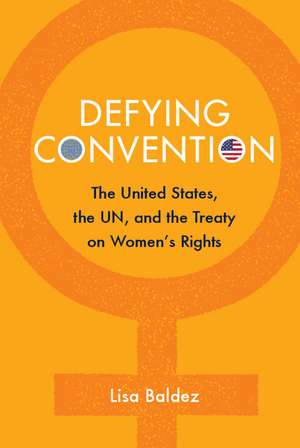Defying Convention: US Resistance to the UN Treaty on Women's Rights: Problems of International Politics
Autor Lisa Baldezen Limba Engleză Paperback – 10 aug 2014
| Toate formatele și edițiile | Preț | Express |
|---|---|---|
| Paperback (1) | 227.61 lei 3-5 săpt. | |
| Cambridge University Press – 10 aug 2014 | 227.61 lei 3-5 săpt. | |
| Hardback (1) | 658.16 lei 6-8 săpt. | |
| Cambridge University Press – 10 aug 2014 | 658.16 lei 6-8 săpt. |
Din seria Problems of International Politics
-
 Preț: 238.60 lei
Preț: 238.60 lei -
 Preț: 200.13 lei
Preț: 200.13 lei -
 Preț: 224.24 lei
Preț: 224.24 lei -
 Preț: 159.18 lei
Preț: 159.18 lei -
 Preț: 251.27 lei
Preț: 251.27 lei -
 Preț: 205.41 lei
Preț: 205.41 lei -
 Preț: 252.21 lei
Preț: 252.21 lei -
 Preț: 247.41 lei
Preț: 247.41 lei -
 Preț: 229.56 lei
Preț: 229.56 lei -
 Preț: 197.90 lei
Preț: 197.90 lei -
 Preț: 332.68 lei
Preț: 332.68 lei -
 Preț: 319.99 lei
Preț: 319.99 lei -
 Preț: 283.41 lei
Preț: 283.41 lei -
 Preț: 282.48 lei
Preț: 282.48 lei -
 Preț: 226.17 lei
Preț: 226.17 lei - 11%
 Preț: 697.28 lei
Preț: 697.28 lei
Preț: 227.61 lei
Nou
Puncte Express: 341
Preț estimativ în valută:
43.56€ • 45.42$ • 36.20£
43.56€ • 45.42$ • 36.20£
Carte disponibilă
Livrare economică 27 februarie-13 martie
Preluare comenzi: 021 569.72.76
Specificații
ISBN-13: 9781107416826
ISBN-10: 1107416825
Pagini: 249
Ilustrații: 2 tables
Dimensiuni: 151 x 228 x 13 mm
Greutate: 0.34 kg
Ediția:New.
Editura: Cambridge University Press
Colecția Cambridge University Press
Seria Problems of International Politics
Locul publicării:New York, United States
ISBN-10: 1107416825
Pagini: 249
Ilustrații: 2 tables
Dimensiuni: 151 x 228 x 13 mm
Greutate: 0.34 kg
Ediția:New.
Editura: Cambridge University Press
Colecția Cambridge University Press
Seria Problems of International Politics
Locul publicării:New York, United States
Cuprins
1. Introduction; 2. A scaffolding for women's rights, 1945–70; 3. Geopolitics and the drafting of CEDAW; 4. An evolving global norm of women's rights; 5. CEDAW impact: process, not policy; 6. Why the United States has not ratified CEDAW; 7. CEDAW and domestic violence law in the United States?; 8. Conclusions.
Recenzii
'Breaking with the conventions in political science that create stark distinctions between the study of domestic politics within nation-states and the study of international relations, Lisa Baldez takes a novel approach to the Convention to Eliminate All Forms of Discrimination against Women (CEDAW). Steeped in the literatures on international organizations, international law, US politics, and women and politics, Baldez demonstrates how the use of gender as an analytical category complicates what is thought to be known about the creation and ratification of international conventions, the status of women in the world over the past half century, and the central cleavages in national politics in both the United States and Chile. This book is thoroughly researched and clearly written, and it covers ground that has not been addressed previously. Baldez's approach is both thought-provoking and provocative.' Mary Hawkesworth, Rutgers, The State University of New Jersey
'This is a lively and important book on an understudied topic, which makes valuable theoretical insights in international relations while providing rich data on CEDAW as a case study of a human rights treaty. Using the puzzling case of US non-ratification of CEDAW, Lisa Baldez convincingly argues that by all rights, the United States should have ratified CEDAW, given that the costs of doing so would be low and the norms embodied in the treaty are rhetorically consistent with US political values. Using fascinating primary sources, Baldez's analysis of the domestic and international obstacles to ratification brings the insights of comparative politics and international relations together in an original way.' Valerie Sperling, Clark University
'… Baldez offers a detailed historical account of the multi-faceted arguments regarding CEDAW's ratification, and sheds much needed light on the extent to which women's rights engage competing interests and conflicting agendas domestically and internationally. Finally, by tracing the sources of deep-seated opposition to CEDAW, and illustrating that the United States' failure to ratify results in compromised human rights protections for American women, Baldez illustrates just how necessary CEDAW is as a convention to enshrine women's rights as global norms.' Wendy O'Brien, Academic Council on the United Nations System (www.acuns.org)
'This is a lively and important book on an understudied topic, which makes valuable theoretical insights in international relations while providing rich data on CEDAW as a case study of a human rights treaty. Using the puzzling case of US non-ratification of CEDAW, Lisa Baldez convincingly argues that by all rights, the United States should have ratified CEDAW, given that the costs of doing so would be low and the norms embodied in the treaty are rhetorically consistent with US political values. Using fascinating primary sources, Baldez's analysis of the domestic and international obstacles to ratification brings the insights of comparative politics and international relations together in an original way.' Valerie Sperling, Clark University
'… Baldez offers a detailed historical account of the multi-faceted arguments regarding CEDAW's ratification, and sheds much needed light on the extent to which women's rights engage competing interests and conflicting agendas domestically and internationally. Finally, by tracing the sources of deep-seated opposition to CEDAW, and illustrating that the United States' failure to ratify results in compromised human rights protections for American women, Baldez illustrates just how necessary CEDAW is as a convention to enshrine women's rights as global norms.' Wendy O'Brien, Academic Council on the United Nations System (www.acuns.org)
Notă biografică
Descriere
This book explores why the United States has not ratified the Convention on the Elimination of All Forms of Discrimination against Women (CEDAW).














